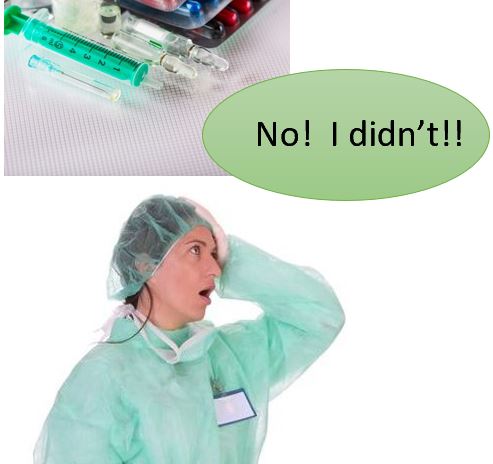Medication Errors and Patients’ Rights of Medication Administration – Implications for Medical Experts
It is estimated that medication errors are among the top three medical malpractice allegations in the United States. Up to half of these may have been preventable and often result from flawed systems. The Patients’ Five Rights of Medication Administration provides a handy mental checklist not only for nurses looking to prevent errors but also for those reviewing medical records for standards of care.
Each year 7,000-9,000 deaths occur due to medication errors and hundreds of thousands experience adverse reactions or complications related to a medication. Many of these go unreported. Costs for ongoing care for patients with medication-associated errors exceed $40 billion each year, with over 7 million patients affected. In addition to costs, patients may experience psychological or physical pain and suffering and lose trust in the healthcare system. The U.S. Food and Drug Administration (FDA) receives more than 100,000 U.S. reports each year associated with a suspected medical error.
The most common reasons cited for errors are:
- Failure to communicate drug orders
- Illegible handwriting
- Wrong drug selection on drop-down menus
- Confusion over similarly named drugs
- Confusion over similarly packaged products
- Errors involving calculating dosing units or weight
One standard in instruction for new nurses is the “Five Rights of Medication Administration”. This provides a mental checklist to help nurses maintain patient safety but can serve as a framework for anyone involved with medication administration. These are:
- Right patient: The name of the patient should match the name on the order. At least two identifiers should be matched. These frequently include the patient’s self-identification, a patient wristband, or a patient photo.
- Right medication: Labels on the medication should be double-checked against the medication order with special caution given to look alike-sound alike drugs (meds that have similar names or physical appearance).
- Right dose: The strength and dose of the medication should be checked against the order. The appropriateness of the dose should be confirmed with current drug reference guides as needed (especially important for pediatric dosing).
- Right route: The order should again be compared to the medication package. It should be confirmed that the patient can take the med by the ordered route (for example, a large pill the patient cannot swallow).
- Right time: The dose should be given at the correct time ordered. This includes checking the frequency and most recently given dose on as-needed (PRN) medications.
Over time, various experts have advanced additional rights to try to improve patient safety during medication administration. The additional rights proposed include:
- Right documentation: Documentation of a medication administration should be done after the medication is given, not before. Charting should include the time and route. It may also include other medication specific information such as an injection site, relevant lab values, or relevant vital signs.
- Right reason: While many medications are commonly prescribed “off-label”, there still needs to be a sound rationale for the order. It must be more likely to benefit the patient than cause harm. For example, antibiotics administered for viral infection are not likely to be of benefit and may cause harm.
- Right response: Responses to medications should be monitored to make sure patients are having the desired effect. For example, did the patient’s blood pressure normalize while taking an antihypertensive?
- Right education: Patients should be given the correct education about what a medication is, why they are prescribed it, and the effects and side effects they might expect.
- Right to refuse: Legally competent patients have a right to refuse care. This should still be assessed and documented in the medical record with appropriate interventions. For example, the patient may need further education, or the prescriber may want to discontinue or change the order.
What This Means for Medical Experts
For those reviewing medical records, knowing the original five rights can help to spot potential deviations from facility policies and procedures or standards of care. Deviations will likely also have triggered medication error reporting protocols in most organizations. The additional rights have been suggested by experts but aren’t formalized. Failure to adhere to these rights may or may not trigger medication error reporting, but they may violate an institution’s internal policies and procedures or represent a failure to follow the standard of care.
Mary Smallwood, RN
President, Greater Orlando Chapter of AALNC
____________________________________________________
Out and About: Our Members Doing Awesome Things!
Lyn Brooks, BSN, RN, LNCC
Lyn has been an RN for 35 years, specializing in Ortho/Neuro Surgery, CCU, Antepartum, Labor and Delivery, Eye Surgery, Case Management and Legal Nurse Consulting. Lyn has been working as an independent LNC since 2001, and founded the Legal Nurse Consulting Group of Central Florida in 2013, specializing in Medical Malpractice, Catastrophic Personal Injury and Worker’s Comp, Nursing Home, Products Liability and Federal Mass Torts, for the plaintiff. Over the years Lyn has mentored several LNCs, many who have been successful with their own LNC businesses. Lyn has been a member of AALNC and the Greater Orlando Chapter of AALNC since 2001, serving as Director at Large, Webmaster and on the Social Committee. In her “free time”, Lyn enjoys riding Dressage, gardening and salt water fishing.
_____________________________________________________
Meet the Greater Orlando Chapter AALNC Board of Directors
Our Board of Directors consists of officers and directors at large (DAL). Our 2021 Leadership team:
President: Mary Smallwood, RN
President Elect: Jillian Talento, BSN, RN, CEN
Immediate Past President: Patty Mitchell, RN, BSN, CLNC
Secretary: Tory Palivoda, BS, RN, LNCC
Treasurer: Kasia Sanders, BA, RN, LHCRM
Director at Large: Robin Axtell, BSN, RN, LNCC
Director at Large: Lyn Brooks, BSN, RN, LNCC
Director at Large: Judy A. Young, MSN, MHL, RN, LNCC

Medication Errors
Cited References and for more information:
1. Tariq RA, Vashisht R, Sinha A, et al. Medication Dispensing Errors and Prevention, StatPearls 2021
2. US FDA, Working to Reduce Medication Errors
3. US Department of HHS, Agency or Healthcare Research & Quality (AHRQ)

Are you feeling a little lonely these days? Need other LNCs to chat, visit and network with? Don’t have an AALNC Chapter near you?
WE ARE NEAR YOU! Maybe not geographically, but through your computer or phone. The Greater Orlando Chapter has members from 15 States – Rhode Island to Washington, Texas to Florida. Since March 2020, all of our meetings and CE Programs are virtual. You can attend from anywhere! And when we start meeting in person again, you can still attend from anywhere. We broadcast all of our meetings and CE Programs as webinars!
CONTACT US NOW:
Email us at: info@orlandoaalnc.org
Or visit us at: www.orlandoaalnc.org
Connect with us on LinkedIn

Join us virtually and/or in person for these upcoming meetings/webinars:
August 10, 2021: “Secrets to Mastering MS Word and Excel – Essential Tools for the LNC”, by Carrollyn Catanzaro, BSN, RN (Webinar)
September 14, 2021: “Human Trafficking” by Patty Mitchell, RN, BSN, CLNC (Possibly in person and virtual)
October 12, 2021: “LNC Panel – The Who, What, When & Where of a Successful LNC Practice” (Possibly in person and virtual)
November 9, 2021: “Standards of Care, Guidelines and Resources”, by Diane Tomacelli, RN, BSN, CLNC (Webinar)
The Greater Orlando Chapter of AALNC is an approved provider of Nursing CE through CE Broker, approved by the following States: Arkansas, District of Columbia, Florida, Georgia, New Mexico, South Carolina and West Virginia. We report CE directly to CE Broker in these states. For attendees from other States, we provide documents to provide to State Boards of Nursing for CE.


We have started a new program, “LNC Success – Q&A with Greater Orlando Chapter Officers and Mentors”. We limit the event to 10 participants, so we can mentor each attendee – new to the LNC world or ready for change – we are there for you! Upcoming sessions:
- August 24, 2021
- October 26, 2021
For more information, contact us at: info@orlandoaalnc.org
